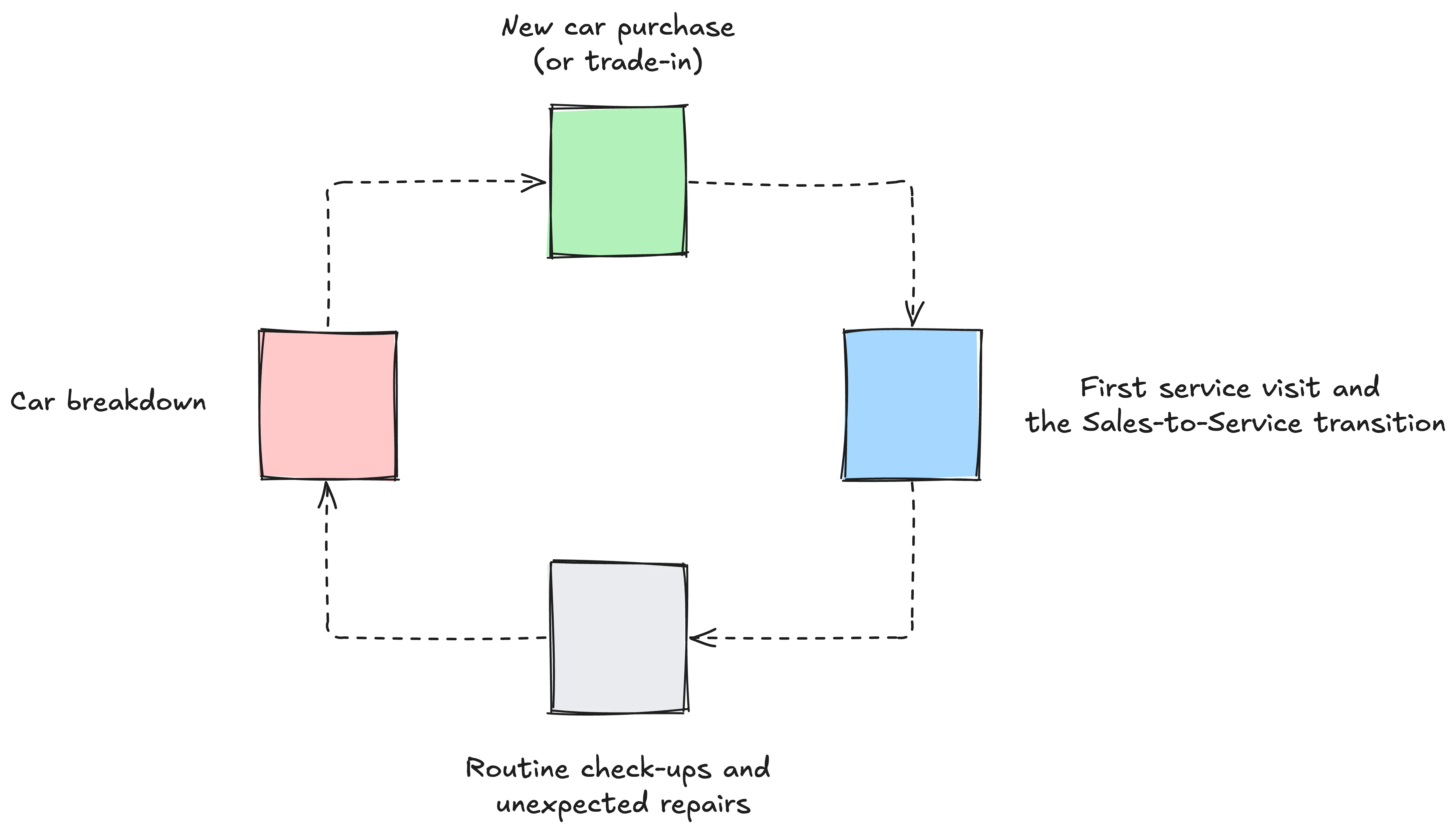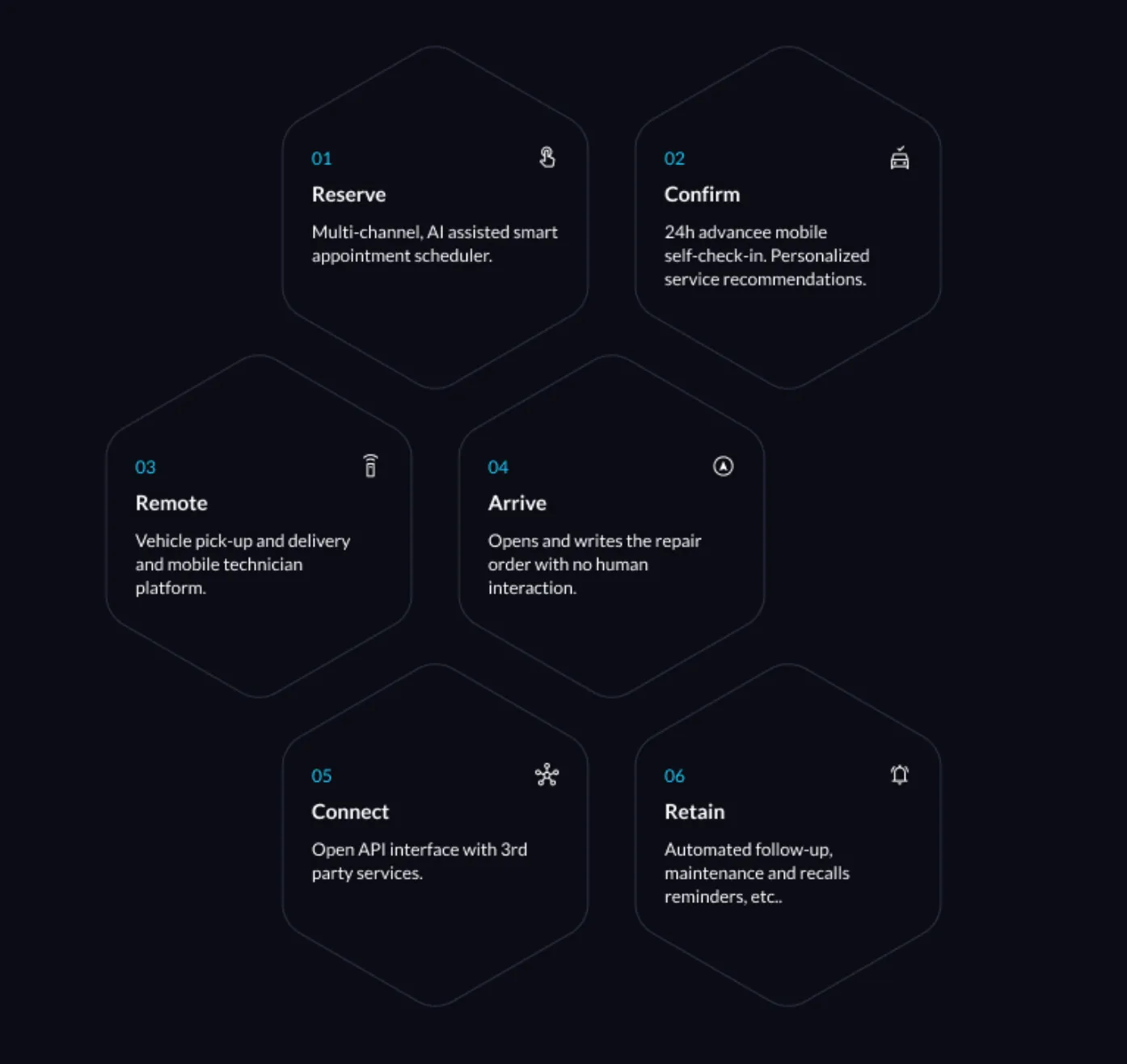This article was co-authored with Bartosz Czerwinski, Chief Technology Officer at Carmen.
Car servicing.
For most people, it’s one of those things that’s just tedious. From calling to make an appointment, juggling your schedule to find an open slot, and the last-minute rescheduling when something else comes up — it’s a hassle.
But what if booking car services and ensuring a smooth customer experience didn’t even involve you at all?
Let’s not get ahead of ourselves. To understand the value AI can bring, let’s first see what a typical car lifecycle looks like:

Each step in traditional car service scheduling requires manual handling, which can make the process slow and inefficient.
Missed appointments, double bookings, and a lack of real-time updates are common frustrations. The car service industry is notorious for no-shows, which can disrupt an auto shop’s schedule and reduce its revenue. It’s a fragmented system, far from the streamlined, tech-driven processes many other industries have adopted.
The automotive industry has seen significant improvements over the past few years, but customer support has always been its backbone. For decades, that support was primarily driven by human interaction — whether through phone calls or in-person visits. With the rise of the internet, online scheduling tools started to appear, but these systems still required a lot of manual intervention.
So, how can we change that?
How can workshops and car dealerships ensure both customers and staff have the best possible experience while increasing revenue?
Our partner, Carmen, took on the challenge of overcoming these bottlenecks.
Carmen uses AI to simplify the process of scheduling service appointments for customers — from making an appointment to handling follow-up tasks.
In practice, it means that instead of calling your local mechanic and waiting for someone to tell you which slots are open, Carmen’s system lets you see available time slots in real-time, book instantly, and receive a confirmation on the spot.
It’s fast, easy, and eliminates the risk of overbooking or confusion.

Carmen enhances the experience at every step of the customer’s journey
Carmen also sends automated reminders to customers, reducing the chances of no-shows — something that can throw a wrench in an auto shop’s daily operations. These reminders are scheduled to give customers a nudge at just the right time, increasing the likelihood they’ll remember their appointment or reschedule if necessary.
But they don’t just stop at booking; it integrates fully with existing dealership management systems (DMS) and customer relationship management (CRM) tools. This integration allows service centers to track customer preferences, vehicle histories, and even push automated recommendations for future services. The system also handles dispatching tasks to the right technicians based on their skills and availability.
Carmen effectively streamlines the entire service scheduling process, creating a foundation that opens the door for additional innovations and for companies like Quickchat AI to take things a step further. By building on the efficiency Carmen provides, Quickchat AI can focus on improving communication and customer interaction through advanced AI capabilities.
Quickchat AI takes advantage of the data generated by systems like Carmen to personalize and enrich customer experiences. It analyzes various aspects of customer data — such as the type of car, service history, and visit frequency — to create tailored interactions.
For instance, if a customer regularly comes in for routine maintenance like oil changes, Quickchat AI can predict when their next service will be needed and send a timely, proactive reminder, encouraging them to book an appointment before they even realize it’s time.
Beyond simple communication, Quickchat AI can also leverage predictive analytics to foresee potential issues.
For example, if a specific model of car is known to have brake problems after reaching a certain mileage, Quickchat AI can alert owners of those models, recommending preventive maintenance before the issue arises. This proactive approach not only keeps customers happy and safe but also allows service centers to plan more efficiently.
By predicting and addressing issues in advance, AI systems like Quickchat help optimize resource allocation. In an auto shop, this means ensuring the right technicians are scheduled for the right jobs and that service bays are utilized effectively throughout the day. AI can also analyze historical data to forecast peak hours, slower periods, and the types of services customers are likely to need, ultimately reducing downtime and operational costs.
AI can ensure that technicians with specialized skills are available when needed for complex repairs, while more routine tasks are delegated to junior staff. This creates a more efficient workflow, improves customer satisfaction, and increases revenue by minimizing wasted time.
The future is closer than you think
Now let’s talk about where this is all heading.
Imagine a future where you, the driver, don’t even have to think about scheduling your car’s next service.
How? Through connected car data, AI can predict when your vehicle will need maintenance and automatically schedule the appointment.
And we’re not talking only conceptually.
Carmen’s patented technology in this space is already in motion.
With connected car technology, your vehicle can monitor its own health in real-time. It knows when the oil needs to be changed, when the brakes are wearing out, and when the tires are getting low. This new system would allow your car to handle its own servicing appointments without human intervention. It could check the availability of your preferred auto shop, schedule a visit, and even suggest the best time based on your calendar.
All you’d have to do is show up, knowing that your car is being taken care of.
If you’re in the automotive industry and thinking about implementing AI into your workflows, schedule a call with Filip or reach out to Carmen.

![Background image for Rethinking Car Servicing With Carmen [Co-Authored Post]](/blog-assets/posts/carServicing_bg.png)